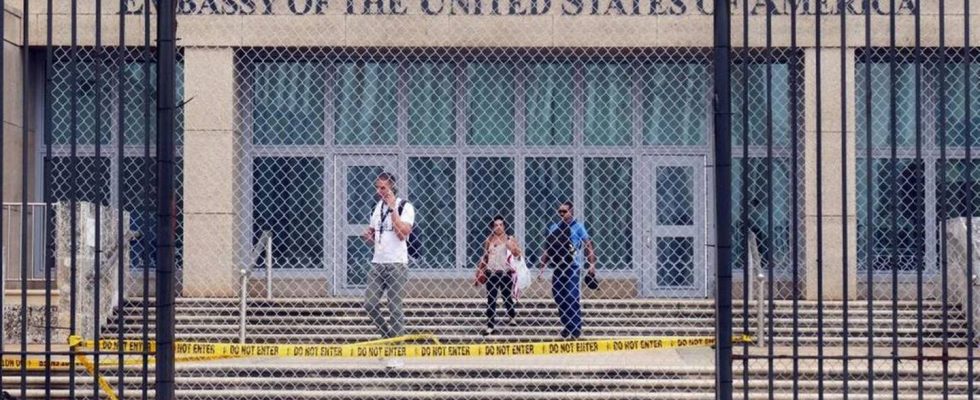Mysterious illness
Havana syndrome at the NATO summit: who is behind it?
People leave the US embassy building
© Emily Michot / Miami Herald / TNS / Imago Images
At the NATO summit in Vilnius last year, participants complained of mysterious symptoms. Was it Havana Syndrome? Very likely, says the Pentagon. Now there is suspicion.
A high-ranking official in the US Department of Defense is at At the NATO summit in Vilnius, Lithuania last year, symptoms similar to those of the so-called Havana syndrome occurred. Pentagon spokeswoman Sabrina Singh confirmed the case in Washington when asked about a corresponding media report. “I can confirm that a senior Department of Defense official experienced symptoms similar to those reported in the unusual health incidents.” The person was at the summit in Vilnius, but was not part of the defense minister’s delegation.
Havana syndrome refers to puzzling symptoms such as headaches, hearing loss, dizziness and nausea, which numerous US diplomats and their relatives living in the Cuban capital Havana complained about. Similar complaints have been reported in other places around the world. Those affected said that the symptoms began after they heard a strange noise or felt strong pressure in their head.
The US government initially did not rule out that it could have been some kind of attack. A good year ago, according to an official report, the majority of US secret services assumed that no “foreign enemy” was responsible for the so-called Havana Syndrome. Instead, the reported complaints are probably the result of previous illnesses, other illnesses or environmental factors.
Havana syndrome made headlines back in 2016
On Monday, journalists from the magazine “Der Spiegel”, together with colleagues from the US news magazine “60 Minutes” (CBS) and the Russian portal “The Insider”, published an investigation that explains why the Havana Syndrome may actually be attacks from the Russian Secret service could be hidden. “Der Spiegel” also quotes a person affected who claims that the first cases of the syndrome appeared in 2014 – in the US consulate in Frankfurt am Main.
According to reports, members of Unit 29155 of the Russian military intelligence service GRU are said to have triggered the incidents using so-called energy weapons. The unit is responsible for foreign operations. She is accused of several attacks outside Russia – including the attempted poisoning of ex-double agent Sergei Skripal in Salisbury, UK in 2018.
According to previous findings, the first cases of Havana syndrome appeared among US diplomats in the Cuban capital in 2016, hence the name. Dozens of Canadian and U.S. diplomats and their families in Havana suffered from health problems such as dizziness, fatigue and headaches, as well as hearing and vision problems.
Later, cases of diplomats and secret service employees who were deployed in China, Germany, Australia, Russia, Austria and even in the US capital Washington also became known.
The journalists therefore come to a different conclusion than a report by the US secret services published in March 2023: According to intelligence coordinator Avril Haines, this showed that the responsibility of an “enemy state” for the incidents was “highly unlikely”.
Moscow rejects allegations – Washington remains silent
In Russia, Kremlin spokesman Dmitry Peskov on Monday dismissed the report as “baseless.” The issue had been “talked about in the press for many years,” but no one had “ever published any convincing evidence.”
The US State Department said it did not want to confirm or comment on the reports. Affected employees were extensively compensated and supported with the help of the Havana Law. The Intelligence Committee concluded in March 2023 that it was unlikely that a foreign adversary was responsible for Havana Syndrome. We stick to this assessment. The secret services would evaluate new information if it were available.

